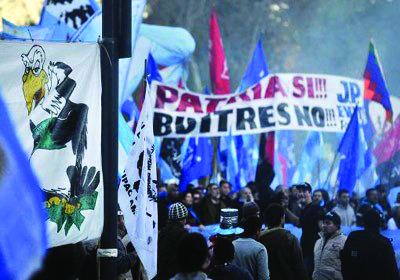On Monday, June 16, the U.S. Supreme Court refused to hear Argentina’s appeal against NML Capital, a “vulture fund” that is demanding full payment on Argentinian debts that the company bought for pennies on the dollar.
Less than an hour later, the Court ruled 7 to 1 that NML Capital — owned by extortionate hedge fund owner Paul Singer — can issue subpoenas to banks to force revelation of Argentina’s assets worldwide.
The Supreme Court’s Monday actions back an extremely onerous ruling against Argentina in 2012 by Judge Thomas Griesa of the federal court in New York’s Southern District, later affirmed by the U.S. 2nd Circuit Court of Appeals in August 2013.
Griesa’s ruling is a Catch-22 that places Argentina in a dead-end and could force it to pay more than $120 billion dollars to all its creditors, far more than it currently owes. Argentina’s president Cristina Fernández Kirchner warns that if it is not able to negotiate a reasonable settlement with NML Capital by June 30, the country faces default.
The dispute is rooted in the 2001 economic crash in Argentina and default of its more than $100 billion foreign debt. The economic policies of Argentina’s leaders — from the military dictatorship in the 1970s to civilian leaders in the 1990s — had turned this resource-rich and industrialized country into the most indebted and privatized economy in Latin America.
Argentina’s crisis included a 50% poverty rate and almost 25% unemployment. Three presidents came and went in less than four years, 1999 to 2003, due to raging anger in the population.
Then, presidents Nestor Kirchner (2003-2007) and Cristina Fernández Kirchner (2007 to present) re-negotiated the country’s debt in 2005 and 2010 with the country’s creditors, with reduced obligations and longer payment terms pegged to the economy’s growth.
Some 92.4 % of Argentina’s foreign debt holders accepted the re-negotiations. They are called the “re-scheduled” creditors. With this and other measures, the economy began to recover. Even under the renegotiated terms, Argentina still paid the banks $173 billion between 2003 and 2013.
Vulture Funds swoop in
But a small number of speculators, representing 7% of Argentina’s creditors — and euphemistically called “hold-outs” — refused to agree to the debt re-scheduling.
They were not the original creditors. Commonly called vulture funds, these companies buy distressed debts in secondary markets for a tiny fraction of the original value. The vultures then sue to demand full principle and accumulated interest on the original debt. They make a killing on their small “investment.”
The main targets of the vulture funds are poor and developing countries, from Africa to Latin America. Another of Singer’s subsidiaries, Kensington International, bought debt in the 1990s from the Republic of Congo-Brazzaville for $1.8 million, went to court and was awarded almost $40 million in Congo’s oil revenues. Singer extracted $47 million from Peru in vulture funds, after an investment of $11 million.
NML Capital had purchased some Argentine distressed debts in 2008 for $48.7 million. Now Singer and NML are demanding full and immediate payment of $832 million, a mark-up of 1608%.
Singer’s NML even recently seized the Argentine naval ship Libertad docked in Ghana, until he was forced to surrender it by the International Court on the Law of the Sea.
But ship aside, the vultures now stand to gain billions from Argentina in the largest sacking of any country so far.
Other vulture funds trying to collect from Argentina are Aurelius Capital Master, Ltd, and Blue Angel Capital.
To grease the wheels for the vulture funds inside U.S. Congress, Singer and the law firm that defends his extortionate practices have paid more than $235,000 to right-wing Cuban-American senators Bob Melendez and Marco Rubio, who in turn have championed Singer’s claims.
On June 22, the Argentina government published a full-page ad in the Wall Street Journal to counter a media blitz by a lobbying group, American Task Force Argentina, financed by the vulture funds.
On Friday, June 20, thousands of Argentinians marched in Buenos Aires under the theme, “Homeland or Vultures.”
The coming days will be critical. At first, President Kirchner said there would be no negotiating with the vultures.
But with the coming deadline of June 30 for the next payments to the re-scheduled creditors, and Griesa’s extremely harsh ruling, the government is now trying to negotiate a deal to soften the financial blow.
Griesa’s Catch-22 order is that if Argentina is forced to pay the almost $1.5 billion to the vultures, the 92.4% of rescheduled creditors could come back and demand full payment as well. As Kirchner’s WSJ ad states, “…if the vulture funds were to be paid, all other bondholders would demand equal treatment, involving an estimated cost of over 120 billion US dollars.”
But if Argentina doesn’t pay the vultures immediately, Griesa’s order prohibits Argentina from paying the rescheduled creditors, too.
During the years of litigation, Argentina’s access to international credit has been severely limited.
Whether in Congo-Brazzaville, Peru or Argentina, it is always workers and peasants who suffer hugely from debt payments that enrich banks and billionaires. In Argentina, the masses did not create the debt. They are the ones who created the country’s wealth.
The Party for Socialism and Liberation defends Argentina against the imperialist banks and vultures, and backs the masses in their struggle for social and economic vindication.
Capitalism — whether vulture funds, the International Monetary Fund or the imperialist governments backing them up — is the crime. The answer is expropriation and socialism. And jail for the vultures and bankers.







